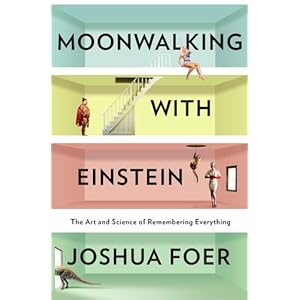Next up is Eduardo Porter’s The Price of Everything: Solving the Mystery of Why We Pay What We Do. Porter, another New York Times reporter, explodes the myth that rational decisions determine supply and demand, and that “value“ is an objective term. In chapters such as ”The Price of Faith,” “The Price of Women,” and “The Price of Culture,” we are provoked, entertained, and enlightened about economic questions and issues that affect us as individuals and as a society. If you enjoyed Daniel Ariel’s Predictably Irrational or Levitt’s and Dubner’s Freakonomics, you will want to read The Price of Everything.
I’m not likely to forget Moonwalking with Einstein: The Art and Science of Remembering Everything. This book’s memorable title is a mnemonic device used by its author, Joshua Foer (yes, Jonathan’s brother) in the 2006 U.S. Memory Championship, which he “trained for” and entered after covering it as a journalist. Foer reminds us that before the age of Google and iPhones, memory was an invaluable art, and that it was developed through the exercise of techniques dating back to the ancient Greeks. We may no longer need to remember facts that are now at our fingertips, but we would all like to better remember the faces, places, and events of our lives. This book assures us that with some practice we can get better at it.

No comments:
Post a Comment